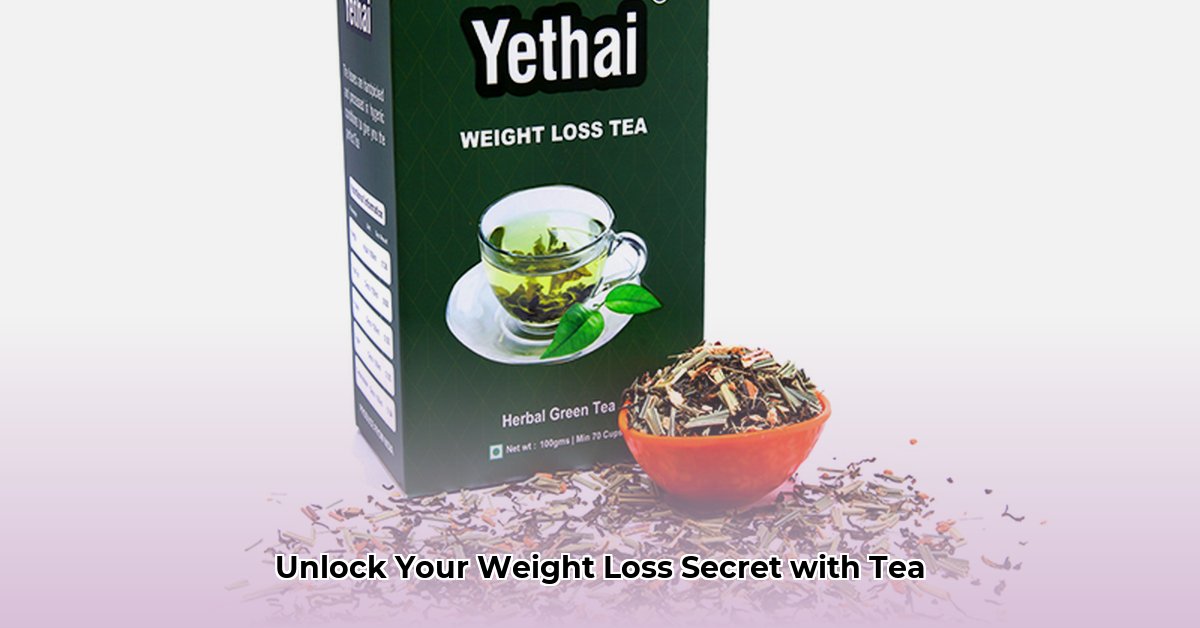
Loose Leaf Tea for Weight Loss: A Deep Dive
Many believe that loose leaf tea can aid in weight loss. While not a miracle cure, certain teas, as part of a balanced lifestyle, may offer benefits. This guide separates fact from fiction, providing evidence-based information.
Understanding the Science Behind Tea and Weight Management
While some studies suggest a link between tea consumption and weight reduction, it's crucial to distinguish correlation from causation. Compounds like catechins (especially epigallocatechin gallate or EGCG), abundant in green tea, may boost metabolism (thermogenesis – the process of heat generation that burns calories) and potentially increase fat burning. However, these are preliminary findings. Numerous factors influence weight, and more research is needed to fully understand tea's role. Green tea frequently appears in studies correlating with lower body weight and BMI, particularly for individuals with type 2 diabetes.
Exploring Different Teas and Their Potential Weight-Loss Benefits
Let's examine the evidence for various teas:
Green Tea: Rich in catechins and EGCG, it’s often associated with a potential metabolic boost and is frequently cited in weight-loss studies, making it a popular choice. However, the extent of its effect remains a topic of ongoing research and the results can vary based on various factors.
Black Tea: Similar to green tea, it contains antioxidants but the processing generally results in lower concentrations of active compounds like EGCG. While it may offer some benefits, the effects are likely less pronounced.
Oolong Tea: A partially oxidized tea, its effects vary depending on processing. More research is necessary to fully understand its impact on weight management.
Pu-erh Tea: This fermented tea’s impact on gut health may indirectly influence weight, but direct robust evidence connecting it to significant weight loss in humans remains limited.
White Tea: The least processed tea, it contains antioxidants but lacks strong direct evidence linking it to significant weight loss.
Herbal Teas: While many herbal teas boast various health benefits, the scientific evidence supporting their direct role in weight loss is generally weaker than for teas derived from Camellia sinensis (green, black, and oolong). They remain a viable, caffeine-free option.
Incorporating Tea into Your Weight Loss Journey: A Practical Guide
Ready to incorporate tea? Follow these actionable steps:
Choose Your Tea Wisely: Select a tea based on the evidence presented, with green tea offering the most robust current support.
Master the Art of Brewing: Follow package instructions to achieve optimal extraction of beneficial compounds. Avoid over- or under-steeping.
Determine Your Ideal Daily Intake: Begin with moderation (2-4 cups of green tea daily, for example), and monitor your body's response. Excessive caffeine may cause anxiety, sleep disturbances, and other adverse effects.
Integrate Tea into a Holistic Approach: Tea is a supplement to, not a replacement for, a balanced diet and regular exercise. These remain cornerstones of effective weight management.
Consult Your Healthcare Provider: Always consult a doctor or registered dietitian before making significant dietary changes or adding supplements, especially if you have any underlying health conditions.
Debunking the Myths: Separating Fact from Marketing Hype
Be wary of exaggerated claims. Many "miracle weight-loss tea bundles" lack significant scientific evidence. Focus on evidence-based strategies: a balanced diet, regular physical activity, and tea as a supplementary element. Healthy weight loss is a gradual process, not a rapid fix.
Potential Risks and Considerations
| Tea Type | Potential Upsides | Potential Downsides | Important Considerations |
|---|---|---|---|
| Green Tea | Boosted metabolism, potential weight loss, antioxidants | Caffeine sensitivity, potential liver issues (high doses) | Moderate consumption, consult a healthcare professional |
| Black Tea | Potential weight management, antioxidants | Caffeine sensitivity, possible interaction with iron | Drink in moderation, consider pairing with iron-rich foods |
| Oolong Tea | Metabolism boost, potential weight-loss effects | Limited research in humans, caffeine effects | Monitor your body's response, explore caffeine-free options |
| Pu-erh Tea | May help regulate blood sugar, potential weight loss | Limited research, caffeine content varies | Consult your physician before using, especially if diabetic |
| White Tea | Antioxidants, some potential weight loss benefits | Limited research in humans, caffeine content | Pay attention to your body's response, further study needed |
| Herbal Teas | Many have antioxidant effects, some may aid in weight loss | May interact with medications, limited data | Talk to your doctor if you take any medications |
Conclusion
Loose leaf tea can be a valuable component of a healthy weight-loss strategy, but it’s not a standalone solution. A comprehensive approach encompassing diet, exercise, and potentially professional guidance is essential for sustainable weight management. Always consult your doctor before making significant dietary changes.
References: (Note: This section would include a properly formatted list of citations from reputable scientific journals and health organizations.)